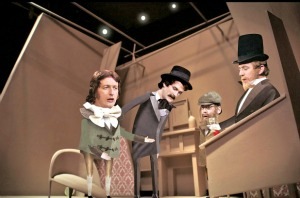Graham Chapman returns from the dead in new Monty Python film By Richard Crouse Tuesday November 13, 2012
 Monty Python has been called the most influential comedy troupe of all time. Their absurdist brand of humour spawned a new word, “pythonesque,” (look it up in the Oxford English Dictionary) and is in the DNA of everything from Saturday Night Live to South Park, from Kids in the Hall to 30 Rock.
Monty Python has been called the most influential comedy troupe of all time. Their absurdist brand of humour spawned a new word, “pythonesque,” (look it up in the Oxford English Dictionary) and is in the DNA of everything from Saturday Night Live to South Park, from Kids in the Hall to 30 Rock.
Mike Myers says, “If comedy had a periodic element table, Python would have more than one atom on it,” and their impact is often compared to The Beatles’ effect on music.
Everyone remarks on the importance of Monty Python. Everyone, that is, except the members of the troupe itself. “I don’t see it as a legacy really,” says founding funnyman Terry Jones. “I can’t see it. I think people talk about it. I have no idea what impact we had on comedy.”
Even though Jones says surviving Pythons have “a limited amount of interest” in new Python projects — “Terry Gilliam is off shooting something in Romania and John Cleese is off in Monaco avoiding paying English tax and getting married again. Never learns,” he says — Cleese, Gilliam, Eric Idle and Michael Palin reunited to commemorate Graham Chapman.
Chapman, who co-authored the classic Parrot Sketch and played lead roles in two of Python’s hit films, Holy Grail and Life of Brian, died in 1989 on the eve of the 20th anniversary of the first broadcast of Monty Python’s Flying Circus. In typical Python form Jones called his passing “the worst case of party-pooping in all history.”
The animated film, A Liar’s Autobiography — The Untrue Story of Monty Python’s Graham Chapman, is a fanciful account of the comedian’s life. Featuring vocal input from his former partners, it also contains a suitably surreal selling point — a return from the grave performance by Chapman, courtesy of recently uncovered audio recordings.
“I kind of felt it was very easy and natural to hear Graham’s voice again,” says Jones of the interacting on tape with his old friend. “It felt like he just walked out of the door.”
Despite their long association, however, Jones says Chapman was “a bit of a mystery to anyone who knew and worked with him. I don’t think we ever felt like we knew him.” He adds that Chapman would “be very pleased with (the film). I think it captures his essence. It captures his oddness, his looniness and a little bit of the mystery.”
